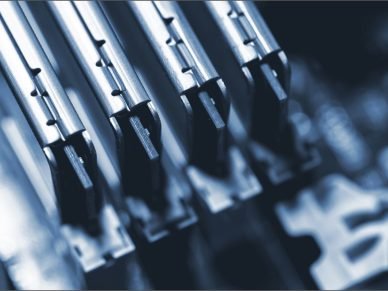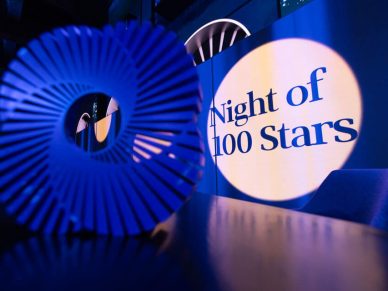Gibson innovation reverberates throughout music history and continues to make unforgettable music moments across the globe

We don’t know what songs those first customers who bought instruments that Orville Gibson made in his one-room shop in Kalamazoo, Mich., in the 1890s were playing. But we bet they sounded great. That’s because from the beginning, quality has been a hallmark at Gibson. The founder, who incorporated the Gibson Mandolin-Guitar Mfg. Co. Ltd. in 1902, was ever an innovator. In 1898, he patented a durable single-piece mandolin design for mass manufacture “to enhance the power and quality of tone.” He’s also credited with inventing the archtop guitar, mimicking the shape of violins.
As tastes changed, the instruments changed, and Gibson remained at the forefront of innovation even after the founder’s death in 1918. In 1934, the Gibson Super 400 came out, an acoustic guitar for the Big Band scene. In 1952, with electric guitars on the rise, the company partnered with famed musician Les Paul to design the Gibson Les Paul, one of the most iconic and best-selling guitars of all time. Throughout the history of popular music, a Gibson guitar has been in the hands of genre pioneers, from “The Mother of Country Music” Maybelle Carter and her Gibson L5 to Woody Guthrie’s Gibson J-45 and L-00 to Bob Marley’s Gibson Les Paul Special to Jimmy Page’s double-neck Gibson Les Paul. At the birth of genres such as bluegrass, blues, country, rock ‘n’ roll, reggae, hard rock, and heavy metal, Gibson has been there. From the beginnings of recorded music, listeners have heard Gibson instruments coming through loud and clear.

“With a rich history of craftsmanship and innovation, Gibson is synonymous with music culture. As the industry leader, we are committed to creating quality, innovative, and inspiring products that resonate with musicians and fans alike,” Gibson chief marketing officer Beth Heidt told BOSS.

Beth Heidt
Heidt, a lifelong music lover and member of the music industry advisory board of the Save the Music Foundation and member of the NAMM Board, took up the mantle of CMO in May and has worked at Gibson Brands for over seven years. She joins newly appointed president and CEO Cesar Gueikian and vice president of product Mat Koehler, who have also been with Gibson for many years.
“The Gibson Leadership team is highly focused on ensuring our global standard of top-quality instruments and products, delivering on production promises and being the best possible partner to our artists, industry, dealer and retail affiliates. In addition, we are dedicated to protecting, strengthening and growing our team and culture on a worldwide scale,” she said. “The mission and the vision for the C suite is the same as Gibson Brands overall ethos, to be the most relevant, played and loved brands across the globe.”
Brand Expansion

Today, the Gibson Brands portfolio includes Gibson; Epiphone, which has been on every stage since 1873; hard rock and metal guitar brand Kramer; amp and accessory brand MESA/Boogie; monitor, headphone, and subwoofer pro audio brand KRK; Maestro, the founder of effect pedals, and Lifton the luxury leather and small goods brand. To reflect the diversity of the portfolio, Gibson Guitar Corporation became Gibson Brands, Inc. in 2013.
Gibson instruments are all handcrafted in America at one of three U.S. “craftories,” so the main brand did not experience the major supply chain issues that many companies did when the Covid-19 pandemic struck. Gibson USA, where all of their electric guitars are made, and Gibson Custom Shop, where all of the custom electric models are created, are both in Nashville, which has been home to Gibson’s headquarters since the 1970s. All of Gibson’s acoustic guitars are handcrafted in Bozeman, Montana.
It was also fortuitous that the Gibson App launched just before the pandemic. Its A.I.-enabled guitar-learning experience delivers interactive lessons, hundreds of new songs added every week, a digital amp, and personal guides from the best guitarists in the world. The Gibson App occupies a truly unique space in the crowded guitar-learning market in that there is something for beginning, intermediate and advanced players to dive into.
“Gibson’s Marquee Artist Program goes beyond guitars to provide already emerging artists with support and services committed to artist career growth,” Heidt said.

The multimedia expansion at Gibson also includes Gibson TV, an award-winning online network with original series that launched in January 2020 and features stories and sessions from guitar legends. The next year, the company announced Gibson Records, partnering with artists “to produce, record, and promote guitar-driven music to the forefront of culture.” The first album released on the label was Slash featuring Myles Kennedy & The Conspirators’ fourth studio album titled “4.” Hailing from Pittsburgh, the Blues-Americana group Ghost Hounds released their fourth studio album, “First Last Time,” on Gibson Records over this past summer.
The Gibson Garage flagship store opened in Nashville in 2021 and features 8,000-square-foot space that’s a combination of memorabilia museum, live music venue, global flagship store, event space and celebration of all things Gibson. One of the prized pieces on the rotating historical displays is a priceless 1907 harp guitar made by Orville Gibson himself. A second Gibson Garage, this one in London, is slated to open in early 2024. Visitors will be able to plug in and play more than 300 electric and acoustic guitars from Gibson Custom Shop to Epiphone and Kramer, as well as explore the entire collection of MESA/Boogie amplifiers, Maestro pedals, and more.
Set up for the Future

With as storied a history as Gibson’s, the company makes great effort to preserve the legacy of the past while paving a way for new artists.
“We continue to evolve what it is to experience Gibson, whether you are a fan in the audience or an artist performing on stage,” Heidt said. “Gibson can provide the best apparel a fan can have, and the best instruments an artist can utilize.”
Gibson Gives, the philanthropic arm of the brand, supports non-profit organizations all over the world in their efforts to advance musicians, youth-focused education, music, health, and wellness initiatives, Gibson Gives has raised over $4.5 million dollars and enabled $46 million in funding for key organizations through product donations and meaningful giving worldwide.
The Gibson Generation Group, aka Gibson G3, is a two-year mentorship program for young players that offers one-on-one mentoring and career growth opportunities to a diverse new generation of guitar players, songwriters, and music creators worldwide. Led by singer/songwriter Abraham Alexander, Gibson’s Marquee Artist Program supports emerging artists who are already making a name for themselves and reflect the brand’s mission to celebrate and amplify music across genders, genres, and generations.
“Aside from Gibson’s unmatched roster of global music superstars across every genre of music, the brand has many programs designed to support both established and emerging artists,” Heidt said. “Music that inspired generational movements was written and performed by young artists with their Gibson and Epiphone guitars and Gibson is committed to an artist-first culture and music discovery.”
In the future, no doubt technology and musical tastes will continue to evolve. Bet on Gibson being there, too, an American icon honoring the past and embracing the new. And it’s going to sound great.















Leave a Reply